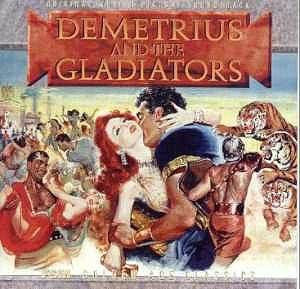Franz WAXMAN
Demetrius and the Gladiators
OST
FILM SCORE MONTHLY Vol 4 No. 19
Available from Film Score Monthly, 8503 Washington Boulevard, Culver City, CA90232; Tel: 1-888-345-6335; overseas: 310-253-9595; fax: 310-253-9588; email: Info@filmscoremonthly.com

A sequel to the 1953 Biblical blockbuster The Robe, this score is a skilful marrying of that film’s original themes composed by Alfred Newman and new material by Franz Waxman.
Opening with ‘Prelude/Night in the Palace’, this fascinating confection expertly incorporates Newman’s splendid motifs, giving them a new spin to create something fresh and dynamic and Waxman complements the other composer’s work with clever variations where the story links back to the characters and incidents from the first film. But the majority of the score is devoted to Waxman’s original compositions and as you might expect there are several brass marches (‘Claudius and Messalina’, ‘Gladiator March’) along with moments of religious grandeur (‘Return to Faith’ in particular, featuring a wonderful burst of fervour adapted from The Robe.) The best of the Waxman cues would have to be ‘Temple of Isis’ where otherworldly voices gradually become more and more forceful and intense.
Everything with this FSM release is of the high quality you would expect from them (although the track summaries seem to have been jumbled up out of numerical order) and there are several unused bonus cues to give added value for money. Also, Alfred Newman’s ‘Hymn to Aton’ from The Egyptian is included as a final extra track. Due to a mixing oversight there was a synchronisation error on this cue on FSM’s release of The Egyptian (FSMCD vol.4 No.5), so they have remixed it and made it available here, hoping that fans who own The Egyptian will also want this score. Whatever the case, it’s a terrific piece of music.
There was a time when Hollywood produced these spectacular epics on a regular basis and perhaps with the advent of Gladiator and The Lord of the Rings: The Fellowship of the Ring we will see a new era of these kinds of films. But one thing that will not be recreated is the distinctive musical style that so enhanced the grandiose productions of the past. Whether it be Bernstein’s The Ten Commandments, Rosza’s Ben Hur or Newman’s The Greatest Story Ever Told , there was a unifying quality, a sense of period, a wonderful evocation of Biblical times. The 1950’s and 60s gave us something individual and valuable and there is an enormous amount of enjoyment to be derived from the work of the great composers who have graced this genre. If I conclude by saying that Waxman’s work here does not rate anywhere near as highly as Newman’s The Robe, that is not to suggest that it does not deserve to be appreciated in its own right.
Mark Hockley

Return to Index